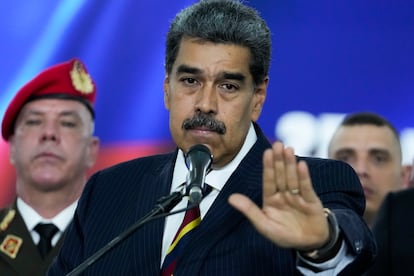Proposals from Brazil and Colombia for new elections or a coalition in Venezuela rejected
Despite the intensifying political crisis in the country, both Maduro’s ruling party and the opposition have dismissed the solutions put forward to date


The political crisis in Venezuela has been intensifying since the country’s presidential elections on July 28 when the National Electoral Council (CNE) proclaimed Nicolás Maduro the winner. Almost three weeks later, Chavismo has still failed to provide evidence to back the claim.
The opposition, which has made public more than 80% of the voting records in its possession, has slammed the result, calling it electoral fraud. Meanwhile, the international community has been more focused on pointing out the lack of transparency than on insisting on who has won.
Close to home, Brazil, Colombia, and Mexico are seeking a negotiated solution, promoted by Brazilian President Luiz Inácio Lula da Silva and Columbia’s Gustavo Petro, involving either new elections or a transitional coalition government which might lead to free elections with guarantees. The proposals, which Mexico’s Andrés Manuel López Obrador has not fully embraced, have been dismissed by both Maduro’s government and the country’s opposition.
Lula and Petro’s proposals come after nearly 20 days of insisting on the publication of the results by the CNE. Now the presidents of Venezuela’s two neighbors are seeking to pile pressure on Maduro, whose electoral triumph they have personally questioned. The Brazilian president said in an interview on August 15: “If [Maduro] has any common sense, he could put it to the people, perhaps calling new elections with a non-partisan electoral committee. Maduro knows he owes the world an explanation.”
There appears to be a consensus in the international community that a transition of power in Venezuela is needed and should be engineered via negotiations, potentially preventing a third Maduro term, which would give him more years in power than the founder of Chavismo, the left-wing populist movement, Hugo Chávez himself.
The repetition of elections is, however, a controversial proposal and has been rejected by both Maduro’s team and the opposition, which has produced proof that its candidate, Edmundo González Urrutia, beat Maduro. “Elections will not be repeated because Nicolás Maduro won,” said Diosdado Cabello, political chief of the ruling United Socialist Party of Venezuela (PSUV).
To date, Maduro has not shown any willingness to seek a solution to the post-electoral conflict and has turned to the government-controlled Supreme Court to try to validate his victory. Whatever the outcome, Maduro remains president until the potential inauguration of a new leader in January 2025.
Maduro’s inertia
Meanwhile, the opposition’s response to fresh elections has been largely negative, though it has expressed a willingness to negotiate, insisting that any dialogue should be based on the July 28 results. Leading opposition figure María Corina Machado stated: “If we go to a second election and Maduro does not like the result, what do we do? Do we go to a third, and then to a fourth or a fifth? We went into an election and we won.”
An election managed by any neutral entity also looks unlikely as the government has strongly condemned the reports coming out of the Carter Center and the United Nations. The July 28 elections supposedly had guarantees as laid out in the Barbados agreement mediated by Norway. Meanwhile, the possibility of a coalition government, such as the Colombian National Front, was also dismissed by Machado, due to the very different Venezuelan context.
Several more ideas could emerge before any government takes the reins in January, despite Maduro’s reluctance to seek a solution. “If there is no willingness from within the Maduro government to start a serious negotiation to find a political solution, in the medium and long term it is very possible that Venezuela will find itself in a blind alley and we do not know how long that will last,” says Mariano de Alba, a specialist in international relations and diplomacy.
Chavismo has already survived periods of diplomatic isolation and that may well happen again a scenario which, according to De Alba, would not be worse than has already been the case since 2019. “In this instance, we are looking at a semi-isolated government at a very high cost to the people, in which the possibilities of economic recovery or a maintenance of last year’s small rebound are negligible.”
Sign up for our weekly newsletter to get more English-language news coverage from EL PAÍS USA Edition
Tu suscripción se está usando en otro dispositivo
¿Quieres añadir otro usuario a tu suscripción?
Si continúas leyendo en este dispositivo, no se podrá leer en el otro.
FlechaTu suscripción se está usando en otro dispositivo y solo puedes acceder a EL PAÍS desde un dispositivo a la vez.
Si quieres compartir tu cuenta, cambia tu suscripción a la modalidad Premium, así podrás añadir otro usuario. Cada uno accederá con su propia cuenta de email, lo que os permitirá personalizar vuestra experiencia en EL PAÍS.
¿Tienes una suscripción de empresa? Accede aquí para contratar más cuentas.
En el caso de no saber quién está usando tu cuenta, te recomendamos cambiar tu contraseña aquí.
Si decides continuar compartiendo tu cuenta, este mensaje se mostrará en tu dispositivo y en el de la otra persona que está usando tu cuenta de forma indefinida, afectando a tu experiencia de lectura. Puedes consultar aquí los términos y condiciones de la suscripción digital.








































